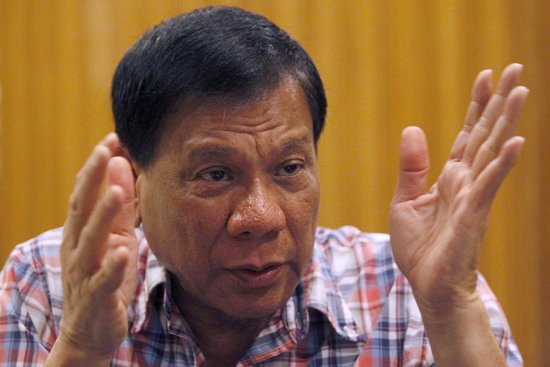
Rodrigo Duterte has been widely condemned for saying he "should have been first" in the 1989 rape and murder of an Australian national
Rodrigo Duterte, the front-runner in next month’s Philippine presidential election, has refused to apologize for comments he made regarding the rape and murder of an Australian missionary, instead saying: “This is how men talk.”
In 1989, Australian national Jacqueline Hamill was raped and killed during a riot at the prison where she worked in the southern Philippines’ Davao City. Duterte, who has served as mayor of Davao for 22 years, was caught on tape referring to the incident during a campaign speech on Sunday.
“They raped all of the women … There was this Australian lay minister … when they took them out … I saw her face and I thought: ‘Son of a bitch. what a pity … they raped her, they all lined up. I was mad she was raped but she was so beautiful. I thought, the mayor should have been first,” Duterte told the crowd, according to Agence France-Presse.
Confusingly, Duterte also said the words were “not a joke” but spoken because of his “utter rage” over the incident he described. “I said it in the heat of anger,” he told reporters outside his home Sunday.
Duterte has been widely condemned for the remarks. Fellow presidential candidate Senator Grace Poe, who has dropped into second place in latest opinion polls, said the comments “reflect his disrespect for women.” Vice President Jejomar Binay, who is also running for the top job, went so far as to release a statement describing Duterte as a “crazy maniac.”
Duterte, nicknamed “the Punisher” and “Duterte Harry” for his zero-tolerance approach to crime, is credited for turning once lawless Davao into one of the archipelago nation’s safest cities. He has vowed to replicate this feat nationwide in three to six months if he wins the May 9 ballot, with voters seemingly unconcerned by persistent allegations that “death squads” under his control are responsible for several hundred extrajudicial deaths.
“Duterte has single-handedly promoted the death squad culture that we are seeing now,” says Carlos Conde, Philippines researcher for Human Rights Watch.
Speaking to TIME earlier this month, Duterte denied that women and children had been caught up in his anticrime dragnet, though he admitted that he had told law enforcement to “be very aggressive” when encountering resistance. “I have not ordered the killing of a woman or a child,” he said. “Even if I want to I cannot do it. But criminals? Sometimes it’s part of my job.”
[time-brightcove not-tgx=”true”]It’s unsure whether the latest uproar will derail Duterte’s presidential ambitions. The 71-year-old has openly boasted of his own philandering, saying he “can’t imagine life without Viagra,” and spoken of “hanging criminals by clotheslines” and dumping so many bodies in Manila Bay that fish would “grow fat.” In November, he even called Pope Francis a “son of a whore” for apparently exacerbating Manila’s already chronic traffic during an official visit. Voters in Asia’s most Catholic nation quickly forgave him, though, and he seemingly turned the controversy to his advantage.
“Duterte has managed to run away with [the election] in terms of social media and the press in general,” says Conde. “You don’t know when he’s being ironic or using hyperbole or pulling your leg.”
Duterte’s abrasive yet populist style has earned comparisons with U.S. Republican presidential front-runner candidate Donald Trump, who has also had to deny accusations of misogyny following controversial comments during campaign events. Duterte shies away from the analogy, though. “It’s one thing to be loudmouth but another to be a bigot.” Duterte told TIME of Trump.